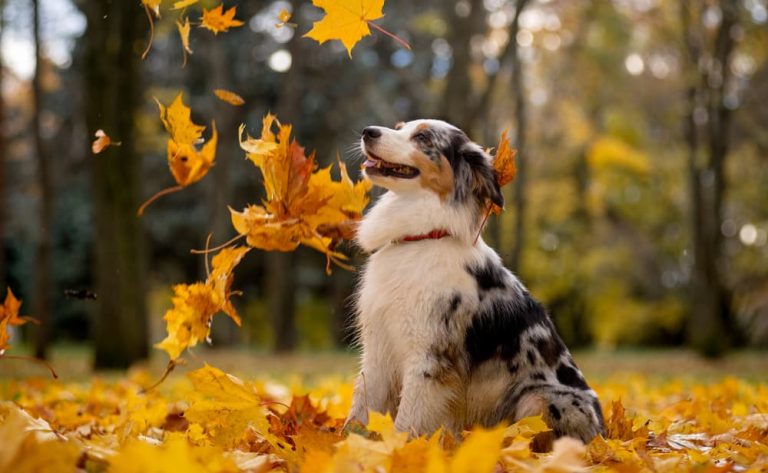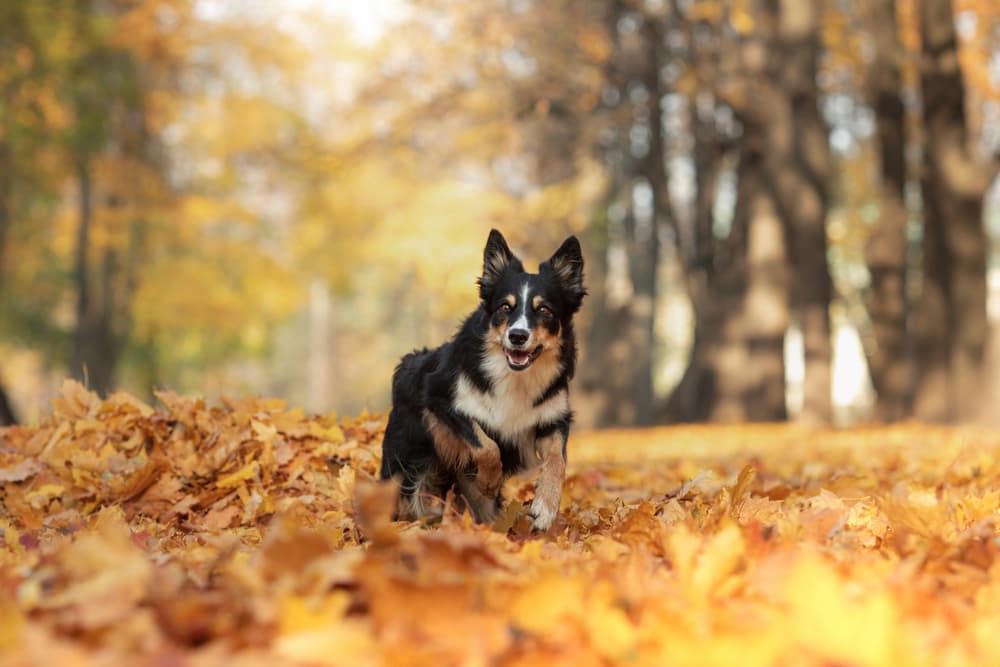7 Shocking Fall Dangers for Dogs

Autumn means cooler temperatures, dogs running through heaps of fallen leaves, and pumpkin-flavored goodness. It’s also a time that can pose potential dangers to our pets. With the days getting shorter and the holidays right around the corner, our dogs can get into all manner of troubles.
To help pet parents understand the risks of the changing seasons (and to avoid unnecessary emergency room visits), we’ve put together this detailed list of fall dangers for dogs.
7 Fall Dangers for Dogs to Watch Out For
Watch out for these seven dangers to help keep your canine companion safe and healthy this season!
Acorns

Mature acorns (or oaknuts) fall off oak trees starting in late summer around August or September and continue to fall throughout October. While these get squirrels scampering around the base of the trees trying to store up reserves, the small brown nuts can be a harmful fall danger for dogs.
“While most acorns aren’t overtly toxic to pets, they can cause stomach and intestinal blockages, which can be fatal without emergency surgery,” says Dr. Megan McCarthy of Best Friends Animal Society. If your dog consumes a large amount of acorns, it could cause kidney or liver damage, as some contain high amounts of tannins, she adds.
If you have oak trees in your neighborhood, monitor your dog during walks and prevent them from eating acorns, and be vigilant about picking up acorns in your backyard if your dog tends to eat things they shouldn’t.
Leaf Piles

Dogs tend to get endless joy jumping through the piles of fallen leaves that you worked hard to gather. While these make for great video clips to share with friends, consuming leaves can cause GI (gastrointestinal) upset, such as vomiting or diarrhea, says McCarthy. Monitor your dogs during playtime in the yard to prevent them from eating leaves, and remove fallen leaves from your yard as soon as you can.
Pet parents typically stop using flea and tick medication when summer ends, but fall is actually peak time for these pesky parasites. If you are planning to be outdoors hiking and playing or if you live in an area that has fleas and ticks, you should continue to use preventatives.
Halloween Candy

Consumption of Halloween candy is one of the most common fall dangers for dogs, says McCarthy. With all the fun happening around this popular holiday, it can be easy to get distracted and leave a bowl of candy within reach of your furry friend. These candies, often made of chocolate, can be toxic to dogs. “While rarely fatal, chocolate ingestion can cause significant illness as it affects the heart, GI system, and blood pressure,” warns McCarthy. Your dog may also eat the wrappers, which can cause stomach or intestinal blockages.
Another risk, McCarthy warns of, is sugar-free candy that contains artificial sweeteners, such as xylitol or birch sugar. “This causes low blood sugar, seizures, liver failure, and even death.”
It is important to keep your Halloween candy away from your dog and in a sealed container. If your dog consumes any candy, call the 24/7 Pet Poison Helpline at (855) 764-7661 to get a diagnosis and a treatment plan if you need to bring him to the veterinarian.
Antifreeze

In really cool and hot temperatures, your car’s antifreeze functions to regulate temperature and keep the vehicle running smoothly. This liquid is also one of the deadliest threats to both dogs and cats. It can pose a risk in garages if it leaks onto the floor and is then licked up by pets.
“It contains the chemical ethylene glycol, which is sweet tasting and odorless, so animals like to lick and consume it — even a tiny amount can be deadly,” warns McCarthy. Once consumed, this causes the animal to appear “drunk” and they may become lethargic, uncoordinated, drink and urinate frequently, experience seizures, or become comatose, she adds. Without treatment, this leads to kidney failure that is fatal.
Keep an eye on your driveway or garage to check for signs of antifreeze leakage. If you spill antifreeze, use litter to soak it up, and dispose of the litter. If you think your pet has ingested antifreeze, contact your veterinarian right away for treatment.
Toxic Mushrooms

Piles of fallen leaves and the damp conditions they create are ideal for mushrooms to crop up in your yard and neighborhood, sometimes overnight. While not all fungi are bad for your dog, it’s important to keep them away from your curious eaters. “Non-toxic mushrooms can still cause GI upset, such as vomiting and diarrhea, if consumed. Some, such as the Amanita mushroom, are deadly,” shares McCarthy.
While out on walks or hikes, keep your pet leashed and maintain a watchful eye on what they might be sniffing to eat. Check your yard daily and remove any mushrooms that may have popped up.
Shorter Days

Most people walk their dogs after work and, with the days being shorter in the fall, it means you are walking with low visibility. This requires a bit more caution and additional precautions. Putting on a reflective collar, harness, and leash can make the dog more visible to automobiles at night, suggests McCarthy. “You can also use light up collars or small flashing lights attached to their harness or leashes for added safety.”
Walking during nighttime also means you have to be a bit more vigilant as to what your dog might be getting into, lest she chomps on that chicken bone on the side of the road, which could splinter and irritate or even puncture their intestines.
Holiday Food Scraps

According to McCarthy, one of the most common veterinary emergencies during the fall and the holiday season is the consumption of human food by pets, such as sweets and candies. You may be tempted to give your dog leftover turkey after Thanksgiving dinner. Turkey skin, ham, and gravy are high-fat foods that can lead to pancreatitis. Additionally, onions and garlic are toxic foods for dogs, so if you have any dishes with these ingredients on the table, keep them away from your pet.
Keep any human food out of reach of your dog and in sealed containers; cover and put away garbage cans, and have dog-safe foods readily available, so your pet doesn’t feel left out. If your dog has consumed anything she shouldn’t, getting immediate treatment (such as induction of vomiting, activated charcoal administration, and supportive care) can help her recover quickly.









